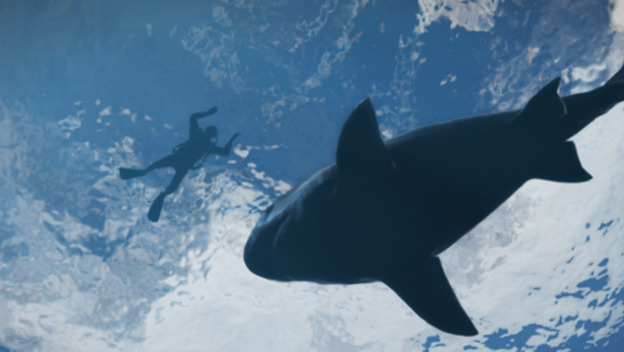When the term “epic” is used in literature, it refers specifically to a type of long-form, narrative poetry that focuses on characters of high standing: men and women above the day-to-day. The genre is best typified by the works of the Greek poet Homer, whose Iliad tells of a legendary war between Greece and Troy which is populated by mythological heroes on both sides. (The term “epic” stems from the Greek word epikos , an adjective derived from epos , which itself means word, story, or poem.)
I mention this because “epic” has been broadened in such a manner that it now refers to anything and everything on a grand scale, but we’re using it here to evaluate a specific medium and its relationship with the narrative, which cleaves fairly close to the original intent of the word.
Games strive for epic. At the very least, most of the ones you’ll see on shelves do, as do the ones that gamers turn out in droves to purchase on launch day and throughout the holiday season. This includes the Call of Duty titles, which are always world spanning and prominently feature catastrophic events on a grand scale. These games tend to lionize their protagonists. Soon after finding Captain Price in Modern Warfare 2, the player’s squad is caught by a rain of rubble, followed by a scene in which Soap and Price stand atop the debris, light streaming down upon them, one with his gun held aloft in a pose that reiterates that, yes, these are heroes and they deserve your adulation.
Even when the story isn’t that tightly wound and the player is set free in a grand world, as in Skyrim, the obsession with the epic continues. As the Dovahkiin, you aren’t merely responsible for your survival or even for stemming the petty squabbles of tyrants and freedom fighters. (Though that is, of course, the sort of world-altering event one might expect on an epic quest.) Your role extends to the primal; it demands that you master forces beyond mortal knowledge; that you hunt and destroy foes that are intended to be many times the equal of a mere man. In Skyrim, you are crafting your epic dragon by dragon, spell by spell.
Even Minecraft, which has no narrative of which one might speak, is built almost entirely on the idea of the grandiose. The most compelling videos for the game involve explorations of intricate, sprawling constructs or accomplishments that use the properties of the engine and the materials therein to fabricate representations of real-world devices. It’s a game in which you can build a functional virtual computer, if a simple one, within your actual computer.
The appeal of the epic is that it generates water-cooler moments: those instances in which you’re standing around with people at work when you are between productive tasks, and you get the chance to bond, or at least stave off encroaching boredom, by expressing your mutual amusement and awe from the events you’ve experienced in your game. Even if the other gamer hasn’t had the exact same experience, they often understand the title enough that they can appreciate the excitement you’re experiencing over it.
This is spectacle. Spectacle is something we love to talk about, because spectacle has an immediate effect on us. Is it superficial? It certainly can be, though there’s no reason a large-scale event can’t dig beneath your skin and worm its way in there. The first Modern Warfare’s nuclear bomb blast is testament to this; it drew attention not just because it was bombastic or controversial, but due to the way in which it made you a personal witness and subject of the horror that had been unleashed.
Contrast this with the smaller stories; stories that focus less on saving the world and don’t even necessarily have an obvious or discrete villain, much less an evil army to be overcome. Morality can be less defined in these stories, exploring the shades of grey between the good and the bad. Heavy Rain keeps jumping into my head because it is so very much the tale of a few people whose paths intertwine. Yes, the Origami Killer is a danger to society as a whole, but the only reason our fear and hatred of him grows so acute as we play is because the characters we control are directly invested in the events he inspires.
That’s a hit that you take in your heart that spreads from within. Maybe it’s not even a hit, just a seed of emotion planted by the game, which soon circulates throughout your body and blooms within your mind. It forces you to think, to consider what you have experienced on a very personal level. This, as opposed to spectacle, which strikes first at the surface, is an immediately deep and introspective wound.
It seems very rare that developers seek to construct something personal, eschewing the small stories for the big epics, because they feel that’s what the all-powerful consumer expects of them. Independent developers, able to produce such projects as To The Moon and The Shivah, tend to use more focused and emotionally engaging narratives to deliver a powerful impact and a memorable experience with a more stringent budget.
None of this is to say that AAA developers entirely miss this sort of experience. Though Rockstar’s open-world games are typically sprawling affairs, and tend to involve fairly large forces at play behind the scenes, their titles in this last generation (in particular) have had very affecting, personal arcs for their protagonists. Characters like Niko Bellic and John Marston aren’t out to save the world, they’re just trying to get their life on the right track.

And maybe that’s why the obsession with the epic really bothers me. The characters who involve themselves in these world-altering events do it with such certainty that it can be difficult to see them as actual characters rather than hollow archetypes fulfilling a designated role. There’s a sense of fate, or destiny, because their goal is something so big that they cannot fail. To fail is to rob the player of vindication, of accomplishment. To fail is to throw the time they’ve invested back in their face, since they’ve not only sat in front of a screen for the duration of your game, but done so while actively trying (struggling in some cases) to perform to a level that satisfies the victory conditions you’ve put into place.
A character study or an emotional journey, though, doesn’t need to have a pot of gold at the end of the rainbow. It has to have resolution, yes, but that resolution can come at a cost beyond simply virtual lives. It can, instead, be a part of the protagonist’s personal journey. There are so many ways to resolve an arc that doesn’t involve the continued existence of the world/galaxy/universe that it boggles the mind.
It’s this mindset that has me excited for The Last of Us and Beyond: Two Souls. They’re on the right track to bring us something different, something that doesn’t just put us through the same summer blockbuster-esque paces again and again. Gaming is waiting for its Catcher in the Rye. Odds are, when it comes, it will be equally as polarizing as that book is. However I feel about the results of such a game, I welcome the challenge it represents.
